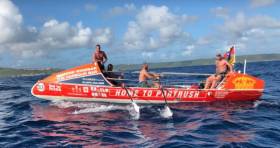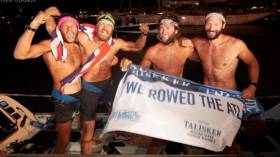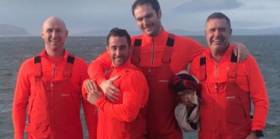Displaying items by tag: Home to Portrush
Home to Portrush Row Across the Atlantic
#Rowing: Home to Portrush rowed into English Harbour on Sunday to finish fifth in the Atlantic Challenge race from the Canaries. The crew of George McAlpin, Ally Cooper, Gareth Barton and Luke Baker took just a month to complete the race, which started on December 14th in La Gomera. They finished fifth overall. Organisers say their row took 31 days eight hours and 57 minutes, which was inside the previous best time for the race. They received a raucous welcome from family and friends on the dock when they landed.
Four Oarsmen Win Atlantic Race in Record-Breaking Time
The first boats have finished the Atlantic Challenge ocean rowing race. The Four Oarsmen from Britain won in a record time of 29 days and 15 hours, which the organisers say is the fastest time ever for a row across the Atlantic Ocean. Team Antigua and Swiss Mocean also finished on Saturday in the race from the Canaries to Antigua in the West Indies which is sponsored by Talisker Whisky.
These three fours will be followed in by solo oarsman Mark Slats in Row4Cancer.
Two boats from Ireland are next in line. Home to Portrush is set to take fifth place, most likely arriving on Sunday. Relentless, a four drawn from Cork and Dublin, should finish on Monday or Tuesday.
Northern Irish Crew On Track in Atlantic Rowing Race
#Rowing: Home to Portrush and Relentless, from Cork and Dublin, look set to finish the Atlantic Challenge race in under a week. The Northern Irish crew has taken a clear fifth place and are putting in good mileage each day – they covered 88 nautical miles (163 kilometres) moving into the 27th day of the race from the Canary Islands to Antigua. The crew of George McAlpin, Ally Cooper, Gareth Barton and Luke Baker had 459 nautical miles (850 km) to the finish.
One place behind them lie another four, Relentless. The Cork/Dublin crew have also benefitted from the favourable winds. If they continue their fine progress they will land in English Harbour in Antigua just one day after Home to Portrush, on January 15th.
Solo oarsman Damian Browne has crossed the 1,000 nautical mile mark and has been punching in very steady times after coming through capsizes, an injured face and a damaged steering system. The Galway man, who rows as Gullivers Travels, is projected to finish on Valentine’s Day, February 14th.


























































